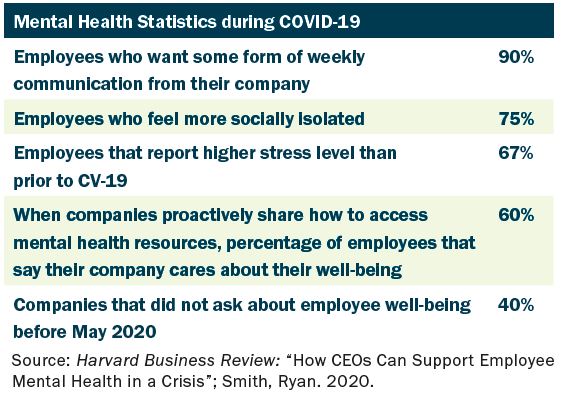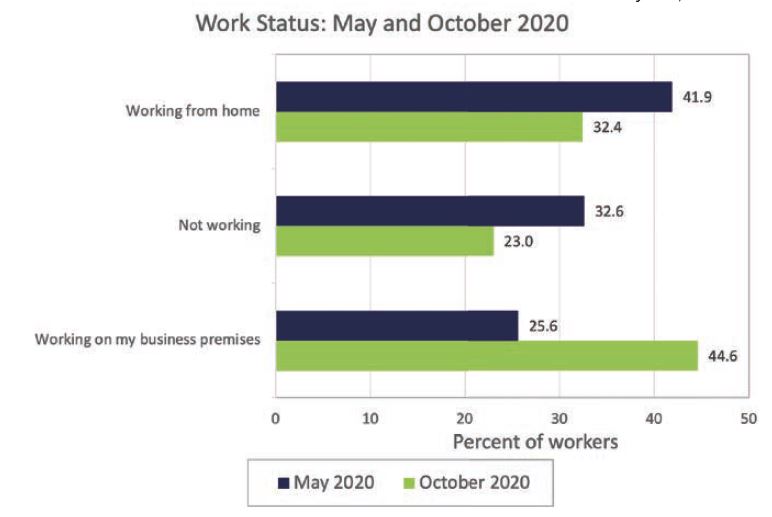- Patient Capital in Action: An Interview with Cambridge Savings Bank’s Yvonne Kizner and Cal Navatto
- The Growing Impact of Supply Chain Finance: Insights from SFNet's 2025 Market Sizing Study
- Secured Finance at Scale: Why the SFNet 2025 Market Sizing Study Matters More Than Ever
- Tiger Group Launches Investment Banking Division Led by Special Situations Veteran Jamie Lisac
- 2025 Ends on a High Note for Syndicated ABL: Strong Finish Despite Uneven Trends
The Pandemic’s Mental Health Toll on Employees
By Brian Resutek

In the immediate days that businesses went remote as COVID-19 quickly rippled through the U.S. economy, the news media was engulfed in speculation about the potential impact on companies’ earnings, loan-loss provisions along with the physical health risk that the virus could have on the population. As terms such as PPE, lockdowns and quarantine became everyday conversation along with the hospital utilization rates and letter-shaped economy models, that graced our televisions, another serious, although less transparent illness was taking aim at employees: their mental health state.
Forty percent…this was the figure cited in a May 2020 Harvard Business Review (HBR) article regarding the percentage of employees that stated their company had not even asked them how they were doing since the pandemic began. While leaders of companies were, in fairness, trying to understand what the next day or even hour might bring, having a firm understanding of the mental aspects of your employees, often a secondary or, in some cases, ignored thought, is instrumental in a company’s response in challenging times. The author looked at this issue from the position of some of the leading sources studying this important topic along with how some SFNet members deal with this critical issue at their respective companies.
Understanding where mental health fits into a company is no easy task, largely because it encompasses all employees and is not a subject of frequent discussion in most companies. As the Harvard Business Review (HBR) wrote in its “How CEOs Can Support Employee Mental Health in a Crisis” article: “Our research shows that mental health of your reports should not be outsourced to human resources.” In fact, the HBR cited that the human resources area, as a group, was the area that employees are least willing to talk to regarding mental health. Instead, the importance of mental health needs to be understood and continually practiced at the manager and even CEO level, as uncomfortable as it may seem.
Practice with mental health awareness has paid dividends for a few SFNet members, including Scott Winicour, CEO of Gibraltar Business Capital, and Marc Cole, CEO of SG Credit Partners. In the case of Gibraltar, Winicour indicated that it starts with proper hiring and onboarding to ensure that the individuals brought into the company understand culture and importance of mental health. “Our management team has been trained to encourage productive conflict, which I believe has made us a stronger organization over the years,” Winicour responded when asked about reactions from his company as the pandemic hit. As a psychology major, Winicour firmly understands that a happy employee is a more engaged and productive employee, which provides strong results to the bottom line. While the pandemic was a change for all at Gibraltar, having already established a solid foundation through various team-building exercises and constant encouragement of all employees to share positive and especially negative feelings, proved beneficial. “We didn’t have to make any material changes to our approach. We stepped up the frequency on contact in the early stages as things were very fluid the first month or two of the pandemic.”

At SG Capital, working remotely was common pre-pandemic, given the spread of employees over seven office locations. CEO Marc Cole cited that, “We have always made communication a priority through scheduled calls and time in our offices. While there was no playbook for this pandemic, we made a concentrated effort to continue one on- one conversations while also giving employees space to focus on family and other issues.” When Zoom and Teams calls suddenly became in vogue for most, SG Capital utilized a different tool in Slack, which Cole credited as more effective, casual and even entertaining during a stressful time for all. An additional benefit of using Slack was the amount of reduced email traffic between employees that will likely remain in the future.
As the world looks optimistically towards coming out of COVID-19, it is important that people understand the mental health effects that have been incurred. As Steven Taylor, the author of The Psychology of Pandemics, argues, “for an unfortunate minority of people, perhaps 10 to 15%, life will not return to normal,” due to the impact on their mental well-being. Experts are trying to alert management that the mental health tail from COVID-19 is most likely long in nature and not
completely understood by most. As researcher Joshua C. Morganstein perhaps best summed up from a manager’s standpoint, “stress is like a toxin, such as lead or radon. In order to understand it and how it is affecting society, we need to know who is exposed, when, how much and what effects were caused by the exposure.”
Nicholas Bloom, a professor at Stanford who recently participated as a panel member for the SFNet 2020 Convention, cautions managers that the increased productivity numbers during Covid may not continue in a post-Covid world. In his December 2020 paper, Why Working from Home Will Stick, Bloom does forecast an increase in productivity of 2.4% along with a permanent shift in greater capacity in the work from home environment. Additionally, even after a vaccine is rolled out, Bloom’s study predicts that 22% of all workdays will be WFH, a dramatic increase from about 5% pre-pandemic, concluding that WFH will become much more of the norm. But some productivity gains only take the pandemic months into consideration and the gains could be short-term in nature or overstated. One of the major reasons is if workers fail to internalize externalities associated with face-to-face collaboration that raise fi rm-level productivity which are stifled when employees work from home. Secondly, while many workers have been WFH full-time during the pandemic, close to 75% intend or prefer to be in the office at least one day a week or more should pre-pandemic conditions return, per Bloom’s sampling.

As it relates to the mental health of a company’s workforce, key management should realize that discussion of mental health is a matter their leadership, as a team, is competent in handling. As a son of a psychologist along with other family members, Marc Cole at SG recognizes that he is more comfortable than most when it comes to mental health and stated that, “managers need to be extra understanding this year and some of the typical metrics/standards of productivity won’t work. SG Capital made a concerted effort to give employees space in the spring to focus on their families and encouraged people to take time off, even if there was no place to go.” While this approach may run counter to traditional business school logic, leaders should always think of their employees’ health as a long-term asset. Or perhaps better stated by Cole, “Balance sheet size and strength are critical, but lenders will only be as productive as their people.”
Gibraltar recognizes the value and investment of people and for years has setup a rotating culture committee that is tasked with building a plan for the fi rm’s team-building events each year.
Scott Winicour admits that not every team building event is a hit, but having these on a consistent basis, with employees taking on different roles, has enabled his company to establish a “very strong cultural foundation, which enabled us to be set up for success when the pandemic hit.” Winicour credits his employees for staying committed to these events over the years as he believes overall productivity increased remotely during the pandemic months, but largely due to established culture and mental health. Winicour noted, “I’ve learned over the years that mental health is not one size fi ts all. Each individual has a unique set of circumstances and needs that we, as leaders, must adapt to.”
Simply stated, true focus on and investment in employees’ mental health must be in every company’s long-term plan. Managers need to be comfortable in speaking with their employees and communicate regularly regarding mental health. As our contributors to this article have indicated, the groundwork for mental health well-being is laid over the years, but is also constantly reevaluated. Additionally, if mental health well-being might be overlooked at your company, it is never too late to start.



.jpg?sfvrsn=f1093d2a_0)
